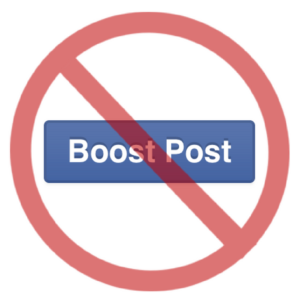Beyond the Boost: Digging in to Facebook Advertising
The Facebook advertising platform has evolved since it first began and is now a digital advertising powerhouse. The platform offers technical support, learning modules through their BluePrint site, an easy ad builder, audience tools and tracking while delivering some of the lowest cost results in the digital space.

In 2012, Facebook added the “Boost” button on posts to simplify their advertising platform for small businesses. Unfortunately, the boost function can oversimplify Facebook’s advertising power. It simplifies the capabilities that make Facebook advertising great for destination marketers: audience targeting, campaign goals, tracking and budget control. Advertisers quickly caught on to the downfalls of the boost, and articles (like this one) are easy to find, warning against using the Boost button.
While it takes a while to get in the swing of things, with a trusted partner (ahem, like us), you can easily add Facebook Advertising to a current or upcoming promotion. Let’s cover the basics:
What to advertise on Facebook
There are several objectives to choose from. An experienced advertiser can help you pick the best objective(s) for what you want to promote. The most common for our clients are:
- Page Posts: Increase engagement (likes, comments, shares) on current posts.
- Event Attendance: Attract new people to RSVP to your Facebook event.
- Clicks to Website: Drive traffic to a specific page of your website.
- Website Conversions: Measure the actions taken on your site after people click through. This can be form submissions, adding items to a cart, check-out and more.
Elements of a Facebook ad
- Defined target audience: With Facebook’s audience tool, you can drill down to very specific geographics, demographics and interests to build an audience.
- Good visuals: These are key to catching the eye of your target audience while they’re scrolling.
- A place to go: Every call to action needs a place to send people. If you’re sending them to a website, make sure they know what they need to do when they get there.
- Pixel Code: Facebook pixels require a code placed on the website, the location depends on what you are measuring. You can run ads without the code, but without this element, you lose some opportunity for data. Namely, the data that tells you how many people did what you wanted them to do.
Other Facebook Advertising Tools
- Instagram: Facebook owns Instagram (and Whatsapp), and their ads platform allows you to place ads on Instagram. You also have the ability to advertise solely on Instagram. One issue with Instagram ads is that they don’t report metrics on likes, new followers, etc. You’ll only really see actions taken on your objective.
- Lookalike Audiences: Make your audiences more specific using Custom and Lookalike Audiences. Using these tools, target customers using spreadsheets, tracking data or activity on your Facebook page. Facebook then matches those people to Facebook profiles, and finds more people like them to make an audience that “looks” like the audience you already have. It doesn’t take long to get the lookalike audience up and running!
- Lead Generation: This tool is great for collecting lead information – names, emails, etc. – without needing to leave Facebook. Staying on the platform increases the likelihood that people will take action. One of my favorite uses is to grow email marketing lists with this tool.
Budget
Facebook requires that you allocate at least $1 per day of your campaign, per objective. If you run a “Clicks to Website” campaign, you’ll need to allocate at least $5 per day. These are the minimums, but it’s better to estimate the reach and frequency you want to achieve with your audience, or base your spend on the budget you have and the results you’re aiming for.
Learn more about Facebook advertising with us.
Contact us about the Social Media Advertising Architect – a DIY solution where we teach you how to implement your own strategic social media advertising campaigns.
Author
Related Posts
What the heck is a Facebook Pixel?
You’ve probably heard of pixels, you may have even heard of Facebook pixels. But what is it, really? A Facebook pixel measures online activities from…
